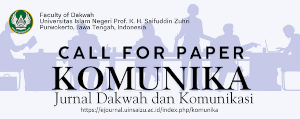Pesan Islam Melalui Radio
Analisis Pendengar Mutiara Pagi RRI Purwokerto
DOI:
https://doi.org/10.24090/komunika.v12i2.1390Keywords:
Islamic Message, Radio, AudienceAbstract
This article examines Islamic material or message broadcast by Radio Republik Indonesia (RRI) through “Mutiara Pagi†program which is focused on reception of listeners in Banyumas Regency. The mass media is not only a tool for disseminating information in all parts of the earth, but also a tool for organizing the agenda, as well as telling people what is important and not. Audience is not merely passive but seen as a cultural agent which has its own power in terms of generating meaning from various discourses offered by the media. The meaning of the media can be open or polysemic and can even be responded by the opposition by the audience. This review contributes to strengthening and developing locally-based broadcasting content. The focus of this study is how reception of Radio Program listeners 'mutiara pagi'. Data collection methods used are forum group discussion (FGD), in-depth interview to get data. While the data analysis is used by analysis of reception. The findings of this study reinforce morley's opinion that explains the three positions related to the meaning of audiences against media messages. These three positions include dominant positions that illustrate that viewers accept, while the negotiable position illustrates that the viewers partly accept partially reject or even criticize the message of “mutiara pagi†program. The audience is partially opposed or refused altogether.Downloads
Download data is not yet available.
References
Adi, T. N. (2012). Mengkaji Khalayak Media Dengan Metode Penelitian Resepsi. Acta Diurna, 8.
Ardianto, Evinaro, dkk. (2009). Komunikasi Massa. Bandung: Sombiosa Rekatama.
Aryani, Kandi. (2006). Analisis Penerimaan Remaja terhadap Wacana Pornografi dalam Situs-Situs Seks di Media Online. Jurnal Masyarakat Kebudayaan Dan Politik, 2.
Basit, A. (2008). Dakwah Antar Individu Teori dan Aplikasi. Purwokerto: STAIN Purwokerto Press.
Chakim, S. (2012). Modernitas dan Media: Isu Nasionalisme. Komunika: Jurnal Dakwah dan Komunikasi, 6 (2) 2012.
Chakim, S. (2015).Kontestasi Kuasa atas UU Produk Tembakau di Media (UU Nomor 36 2009),. Komunika, 9.
Dan Laughey. (2007). Key Themes in Media Theory. England: Open University Press.
Darmanto, A. (2001). Pemahaman dan Aplikasi Prinsip-Prinsip Radio Publik. Yogyakarta: Yayasan Triguna.
Hadi, Prijana Ido. (2009). Penelitian Khalayak Dalam Perspektif Reception Analysis. Jurnal Scriptura, 3.
Ilaihi, Wahyu. (2010). Komunikasi Dakwah. Bandung: Remaja Rosdakarya.
Klaus Bruhn Jensen & Nicholas W. Jankowski. (1999). A Handbook of Qualitative Methodologies for Mass Communication Research. London: Routledge.
Littlejhon, Stephen W. dan Karen A. Foss. (2011). Teori Komunikasi. Jakarta: Salemba Humanika.
Morley, D. (1996). Cultural Transformations: The Politics of Resistance. In Media Studies: A Reader. Edinburgh: Edinburgh University Press.
Munawir, A. W. (1984). Al-Munawir Kamus Arab Indonesia. Yogyakarta: Krapyak.
Rakhmat, Jalaluddin. (2000). Psikologi Komunikasi. Bandung: Remaja Rosdakarya.
Rianto, Puji, dkk. (2010). Melacak Ideologi Jurnalis LPP RRI. Yogyakarta: Puslitbangdiklat LPP RRI dan Pusat Kajian Media dan Budaya Populer.
Tasmara, Toto. (1986). Komunikasi Dakwah. Jakarta: Gaya Medi Pratama.
Yasu’i, Louis Ma’luf. (1935). Al-Munjid Mu’jam Madrasiyyi li al-Lughah al-Arabiyyah. Beirut.
Yuniarto, P. R. (2014). Masalah Globalisasi di Indonesia:Antara Kepentingan, Kebijakan, dan Tantangan. Jurnal Kajian Wilayah, 5.
Ardianto, Evinaro, dkk. (2009). Komunikasi Massa. Bandung: Sombiosa Rekatama.
Aryani, Kandi. (2006). Analisis Penerimaan Remaja terhadap Wacana Pornografi dalam Situs-Situs Seks di Media Online. Jurnal Masyarakat Kebudayaan Dan Politik, 2.
Basit, A. (2008). Dakwah Antar Individu Teori dan Aplikasi. Purwokerto: STAIN Purwokerto Press.
Chakim, S. (2012). Modernitas dan Media: Isu Nasionalisme. Komunika: Jurnal Dakwah dan Komunikasi, 6 (2) 2012.
Chakim, S. (2015).Kontestasi Kuasa atas UU Produk Tembakau di Media (UU Nomor 36 2009),. Komunika, 9.
Dan Laughey. (2007). Key Themes in Media Theory. England: Open University Press.
Darmanto, A. (2001). Pemahaman dan Aplikasi Prinsip-Prinsip Radio Publik. Yogyakarta: Yayasan Triguna.
Hadi, Prijana Ido. (2009). Penelitian Khalayak Dalam Perspektif Reception Analysis. Jurnal Scriptura, 3.
Ilaihi, Wahyu. (2010). Komunikasi Dakwah. Bandung: Remaja Rosdakarya.
Klaus Bruhn Jensen & Nicholas W. Jankowski. (1999). A Handbook of Qualitative Methodologies for Mass Communication Research. London: Routledge.
Littlejhon, Stephen W. dan Karen A. Foss. (2011). Teori Komunikasi. Jakarta: Salemba Humanika.
Morley, D. (1996). Cultural Transformations: The Politics of Resistance. In Media Studies: A Reader. Edinburgh: Edinburgh University Press.
Munawir, A. W. (1984). Al-Munawir Kamus Arab Indonesia. Yogyakarta: Krapyak.
Rakhmat, Jalaluddin. (2000). Psikologi Komunikasi. Bandung: Remaja Rosdakarya.
Rianto, Puji, dkk. (2010). Melacak Ideologi Jurnalis LPP RRI. Yogyakarta: Puslitbangdiklat LPP RRI dan Pusat Kajian Media dan Budaya Populer.
Tasmara, Toto. (1986). Komunikasi Dakwah. Jakarta: Gaya Medi Pratama.
Yasu’i, Louis Ma’luf. (1935). Al-Munjid Mu’jam Madrasiyyi li al-Lughah al-Arabiyyah. Beirut.
Yuniarto, P. R. (2014). Masalah Globalisasi di Indonesia:Antara Kepentingan, Kebijakan, dan Tantangan. Jurnal Kajian Wilayah, 5.
Downloads
Published
2018-09-03
Issue
Section
Articles
License
Authors who publish with this journal agree to the following terms:
- Authors retain copyright and grant the journal right of first publication with the work simultaneously licensed under a Creative Commons Attribution-ShareAlike 4.0 International License that allows others to share the work with an acknowledgement of the work's authorship and initial publication in this journal.
- Authors are able to enter into separate, additional contractual arrangements for the non-exclusive distribution of the journal's published version of the work (e.g., post it to an institutional repository or publish it in a book), with an acknowledgement of its initial publication in this journal.
- Authors are permitted and encouraged to post their work online (e.g., in institutional repositories or on their website) prior to and during the submission process, as it can lead to productive exchanges, as well as earlier and greater citation of published work (See The Effect of Open Access).

























